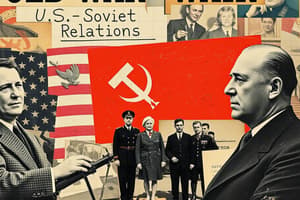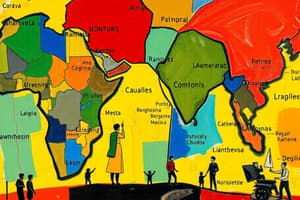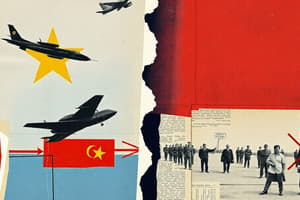Podcast
Questions and Answers
What were the Soviet Satellite nations during the Cold War?
What were the Soviet Satellite nations during the Cold War?
- Poland
- Czechoslovakia
- Hungary
- All of the above (correct)
Who declared the term 'Iron Curtain'?
Who declared the term 'Iron Curtain'?
Winston Churchill
When was the Truman Doctrine announced?
When was the Truman Doctrine announced?
- April 4, 1949
- March 12, 1947 (correct)
- June 4, 1945
- December 7, 1941
George Kennan formulated the policy of containment for fighting the Cold War.
George Kennan formulated the policy of containment for fighting the Cold War.
Who was the author of the Marshall Plan?
Who was the author of the Marshall Plan?
What was COMECON?
What was COMECON?
What event marked the beginning of the Berlin Blockade?
What event marked the beginning of the Berlin Blockade?
What was the main purpose of the Berlin Airlift?
What was the main purpose of the Berlin Airlift?
The _____ Wall separated East and West Berlin.
The _____ Wall separated East and West Berlin.
NATO stands for the North Atlantic Treaty Organization.
NATO stands for the North Atlantic Treaty Organization.
Which countries were part of the Warsaw Pact?
Which countries were part of the Warsaw Pact?
What characterized the Second Red Scare?
What characterized the Second Red Scare?
What was the outcome of the Hiss-Chambers case?
What was the outcome of the Hiss-Chambers case?
Julius and Ethel Rosenberg were convicted of conspiracy to commit espionage.
Julius and Ethel Rosenberg were convicted of conspiracy to commit espionage.
Who is known for McCarthyism?
Who is known for McCarthyism?
Who was the leader of Communist China?
Who was the leader of Communist China?
Flashcards
Soviet Satellite Nations
Soviet Satellite Nations
Nations aligned with the Soviet Union during the Cold War, subject to its influence.
"Iron Curtain"
"Iron Curtain"
A symbolic division between Western democracies and Eastern communist countries in Europe.
Truman Doctrine
Truman Doctrine
U.S. policy to contain Soviet expansion by providing support to countries threatened by communism.
Containment Policy
Containment Policy
Signup and view all the flashcards
Marshall Plan
Marshall Plan
Signup and view all the flashcards
COMECON
COMECON
Signup and view all the flashcards
Berlin Blockade
Berlin Blockade
Signup and view all the flashcards
Berlin Airlift
Berlin Airlift
Signup and view all the flashcards
Berlin Wall
Berlin Wall
Signup and view all the flashcards
NATO
NATO
Signup and view all the flashcards
Warsaw Pact
Warsaw Pact
Signup and view all the flashcards
Second Red Scare
Second Red Scare
Signup and view all the flashcards
Hiss-Chambers Case
Hiss-Chambers Case
Signup and view all the flashcards
Julius and Ethel Rosenberg
Julius and Ethel Rosenberg
Signup and view all the flashcards
Joseph McCarthy
Joseph McCarthy
Signup and view all the flashcards
Mao Zedong
Mao Zedong
Signup and view all the flashcards
Study Notes
Soviet Satellite Nations
- Satellite nations were aligned with the Soviet Union during the Cold War, subjected to its influence and pressure.
- Key satellite nations included Poland, Czechoslovakia, Hungary, Romania, Bulgaria, and East Germany.
Winston Churchill and the "Iron Curtain"
- Winston Churchill famously declared an "iron curtain" across Europe, symbolizing the division between the Western democracies and Eastern communist countries.
- His quote referenced the region from Stettin in the Baltic to Trieste in the Adriatic.
Truman Doctrine
- Announced by President Harry S. Truman on March 12, 1947, the Truman Doctrine aimed to contain Soviet imperialism.
- Initially focused on providing support to Greece and Turkey to counteract potential Soviet expansion.
Containment Policy
- Developed by George F. Kennan in 1947, the containment policy was the cornerstone of U.S. strategy during the Cold War.
- The goal was to prevent the spread of communism and Soviet influence.
Marshall Plan
- Proposed by George Marshall, this plan aimed to rebuild Europe after World War II and prevent the spread of communism.
- Marshall became Secretary of State in January 1947 after his retirement, leading efforts for U.S. foreign aid.
COMECON
- The Council for Mutual Economic Assistance (COMECON) served as the Eastern Bloc’s response to the Western European economic cooperation organization.
- It focused on economic coordination among communist states.
Post-War Germany
- Post-war Germany was divided into sectors controlled by the Allies in the west and the Soviet Union in the east.
- The division resulted in significant political and social changes in the region.
Berlin Blockade
- The Berlin Blockade (June 24, 1948 - May 12, 1949) was a significant Cold War crisis, where the Soviet Union blocked access to Berlin's Western sectors.
- This blockade aimed to exert control over the entire city and undermine Western influence.
Berlin Airlift
- The Berlin Airlift was a military operation delivering supplies to West Berlin via air after East Germany blocked ground routes.
- It was crucial in sustaining West Berlin during the blockade and demonstrated Western commitment to defending the city.
Berlin Wall
- Erected in 1961, the Berlin Wall was a fortified barrier separating East and West Berlin to prevent East Germans from defecting.
- It symbolized the broader divide between communist and capitalist worlds until its fall in 1989.
North Atlantic Treaty Organization (NATO)
- NATO, founded on April 4, 1949, was a military alliance among Western nations aimed at collective defense against potential Soviet aggression.
- It represented a crucial aspect of Western unity during the Cold War.
Warsaw Pact
- Established in 1955, the Warsaw Pact was a military alliance of communist nations in Eastern Europe, countering NATO.
- Member nations included Bulgaria, Czechoslovakia, East Germany, Hungary, Poland, Romania, and the Soviet Union.
Second Red Scare
- Beginning in 1947, the Second Red Scare was characterized by fears of Communist infiltration in the U.S., influenced by HUAC hearings.
- Propaganda efforts intensified to promote unity against perceived communist threats.
HUAC/Hiss Chambers Case
- The Hiss-Chambers Case involved allegations of perjury against Alger Hiss, a government official accused of espionage.
- This highly publicized trial reinforced fears of communism and sparked intense political debate.
Julius and Ethel Rosenberg
- Julius and Ethel Rosenberg were executed in 1953 for conspiracy to commit espionage, accused of leaking atomic secrets to the Soviets.
- Their trial and execution generated widespread controversy and debate over justice and anti-communist sentiments.
Joseph McCarthy and "McCarthyism"
- Senator Joseph McCarthy led the anti-communist movement in the U.S. during the 1950s, known as McCarthyism.
- His aggressive investigations fueled paranoia and led to numerous unfounded accusations against public figures and citizens.
Communist China and Mao Zedong
- Mao Zedong was a central figure in the founding of the Chinese Communist Party in 1921.
- His leadership contributed to the establishment of the People’s Republic of China in 1949, fundamentally altering global politics.
Studying That Suits You
Use AI to generate personalized quizzes and flashcards to suit your learning preferences.




